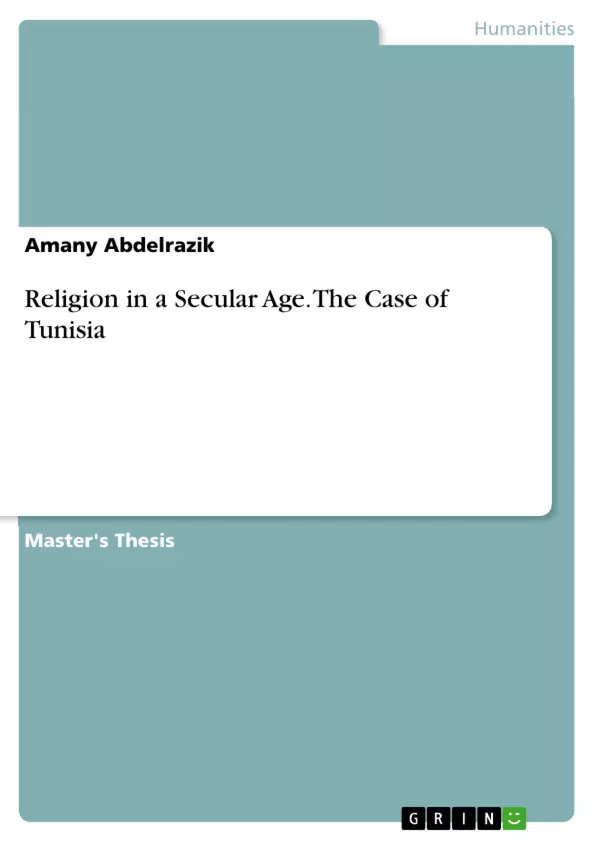The debates over the relationship between a Western secular modernity associated with specific historical practices and secular modernity as a universal category have never lost their momentum as a controversial topic in the discourse of modernization and the nature of both the modern society and individual. While according to the prevailing discourse in the West a universal secularism is based on a universal reason valid to all cultures, other Western as well as non-Western thinkers and sociologists, in particular postcolonial scholars, refute the possibility of a singular secular paradigm valid for all times. They argue that such a universal paradigm with its Western ideals negates non-Western histories and philosophies and thus is a hegemonic model of modernity.
This paper is a critique of the unveiled secular modern / veiled religious traditional divide in the modernist discourse in light of current debates of both postmodernists and neo-secularists. Following the secularization process in postcolonial Tunisia as part of the state´s modernization movement, this paper sheds light on the suppression of the non-Western religious actor under the narrative of a universal rational modernity in the modern age.
Inhaltsverzeichnis (Table of Contents)
- Introduction
- Chapter I: A Critique of the Universal Rational Modernity
- Chapter II: Secular Modernization and the Middle Eastern Elite
- Chapter III: Modern Secular Tunisia and the "Pre-modern" Religious Veil
Zielsetzung und Themenschwerpunkte (Objectives and Key Themes)
This paper examines the tension between secular modernity and religious tradition in postcolonial Tunisia, focusing on the controversial ban on the Islamic veil. It critiques the notion of a universal secular paradigm, arguing that it fails to account for the diverse experiences and realities of non-Western societies.
- The relationship between secular modernity and religious tradition in Tunisia
- The critique of the universal secular paradigm
- The suppression of religious expression in the name of secular modernization
- The role of the Islamic veil in contemporary Tunisian society
- The impact of Western modernity on non-Western cultures
Zusammenfassung der Kapitel (Chapter Summaries)
- Introduction: This chapter introduces the paper's focus on the controversial ban on the Islamic veil in Tunisia, highlighting the tension between secular modernization and religious practice. It uses the case of Saida Adali, a school teacher who was suspended for wearing a headscarf, to illustrate the suppression of religious expression in the name of secularism.
- Chapter I: A Critique of the Universal Rational Modernity: This chapter delves into the theoretical framework of the paper, critiquing the notion of a universal secular paradigm. It draws on both neo-secular and postmodern thought to argue that religion has not disappeared from modern societies and that a singular model of modernity cannot be applied to all cultures.
- Chapter II: Secular Modernization and the Middle Eastern Elite: This chapter examines the historical context of secular modernization in Tunisia, focusing on the role of the elite in promoting a secular agenda. It analyzes the ways in which secularization was used as a tool to undermine religious authority and to establish a modern state.
- Chapter III: Modern Secular Tunisia and the "Pre-modern" Religious Veil: This chapter explores the specific case of the Islamic veil in Tunisia, arguing that the ban on the headscarf reflects a broader effort to suppress religious expression and to impose a Western model of modernity on Tunisian society.
Schlüsselwörter (Keywords)
This paper focuses on the key themes of secular modernity, religious tradition, Islam, Tunisia, the Islamic veil, postcolonialism, neo-secularism, postmodernism, and the critique of universalism. It explores the impact of Western modernity on non-Western cultures and the challenges of navigating a secular age in a religiously diverse world.
Frequently Asked Questions
What is the main conflict discussed regarding Tunisia?
The paper examines the tension between secular modernity, promoted by the Tunisian elite, and religious traditions, specifically focusing on the ban of the Islamic veil.
Why is the 'universal secular paradigm' criticized?
Postcolonial scholars argue that this Western-centric model negates non-Western histories and philosophies, acting as a hegemonic model of modernity.
What was the role of the elite in Tunisia's secularization?
The Middle Eastern elite used secular modernization as a tool to establish a modern state and undermine traditional religious authority during the postcolonial movement.
How is the Islamic veil viewed in the modernist discourse?
In the modernist narrative, the veil is often labeled as 'pre-modern' or traditional, leading to its suppression in favor of a 'rational' secular image.
What theoretical frameworks are used in the analysis?
The paper draws on postmodernist, neo-secularist, and postcolonial theories to critique the divide between secular-modern and religious-traditional.
What does the case of Saida Adali illustrate?
It serves as an example of the practical suppression of religious expression, where a teacher was suspended for wearing a headscarf in the name of secularism.
- Citation du texte
- Amany Abdelrazik (Auteur), 2015, Religion in a Secular Age. The Case of Tunisia, Munich, GRIN Verlag, https://www.grin.com/document/337808



